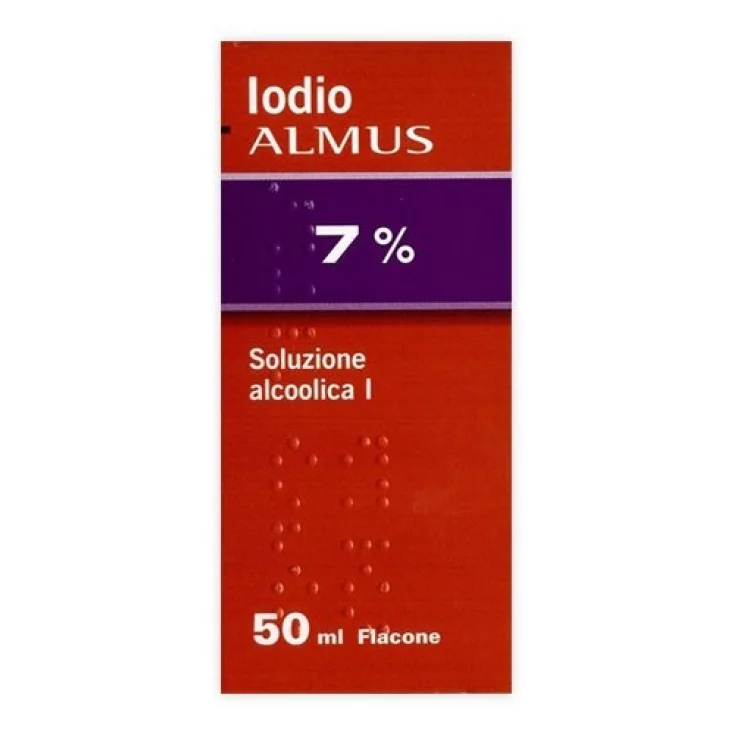Iodine Sol Alco I 50ml

- Brand: ALMUS Srl
- Product Code: 031316021
- EAN:
- Availability: In Stock (evaso in 24 ore)
- 3 items
for 5,03€ each - 4 items
for 4,92€ each - 5 items
for 4,82€ each
What it is and what it is used for
Disinfection of intact skin for occasional treatments.
What you need to know before taking the medicine
Hypersensitivity to the active substances or to any of the excipients. Generally contraindicated in pregnancy (see Special warnings). Do not use in children under 6 months of age.
Warnings and precautions
For external use only. Do not swallow. Avoid contact with eyes.
Pregnancy and breastfeeding
Ask your doctor or pharmacist for advice before taking any medicine.
Iodine is poorly absorbed when used as intended.
Iodine that reaches the systemic circulation crosses the placenta, and excess iodine is harmful to the fetus: iodine use during pregnancy has been associated with goiter, hypothyroidism, respiratory problems, enlarged heart, compression of the trachea, and neonatal death.
Iodine is excreted in breast milk. The use of excessive doses of iodine in mothers during breastfeeding may increase the level of iodine in breast milk and cause transient hypothyroidism in infants.
The use of iodine, even when applied topically, is generally to be avoided during pregnancy and breastfeeding.
Prolonged application can cause irritation and caustification of the treated surface, therefore the medicine must not be used for prolonged treatments.
The medicine must only be applied to intact and undamaged skin, as in addition to causing irritation, it delays the healing of wounds and abrasions. Use, especially if prolonged, can give rise to sensitization phenomena. In this case, stop treatment and contact your doctor who will be able to adopt suitable therapeutic measures. To avoid excessive absorption of iodine, do not cover the treated skin area with occlusive bandages. In case of use for prolonged periods on large body surfaces, on mucous membranes or under occlusive dressings, particularly in children and patients with thyroid disorders, it is necessary to carry out thyroid function tests.
Since iodine can alter the function of the thyroid, it is recommended to be used with caution in subjects with thyroid disease, in patients over 45 years of age or with goiter.
In pediatric age use only in cases of real need and under medical supervision.
Stop treatment at least 10 days before carrying out a scan with labeled iodine.
Following treatment, the results of thyroid function tests may be altered, especially in premature newborns.
After a short period of treatment without appreciable results, consult your doctor.
Possible side effects
Like all medicines, iodine can cause side effects, although not everybody gets them. Below are the side effects of iodine. There is insufficient data to establish the frequency of the individual effects listed.
Pathologies of the skin and subcutaneous tissue
Burning or irritation, acneiform eruptions, iododerma, delayed healing of damaged tissues. Inhalation of iodine vapors is very irritating to mucous membranes.
Immune system disorders
Hypersensitivity reactions including urticaria, angioedema, skin haemorrhages or purpura, fever, arthralgia, lymphadenopathy and eosinophilia.
Iodine, when administered topically as recommended, is absorbed only in small quantities with minimal systemic effects. However, the adverse reactions due to systemic effects of the drug are listed below, which could occur in cases of anomalous absorption (abundant, prolonged use or with occlusion of the treated skin area).
Endocrine disorders
Effects on the thyroid can cause goiter and hypothyroidism, as well as hyperthyroidism (Basedow's disease). Goiter and hypothyroidism may occur in newborns exposed to iodides during pregnancy. Iodine can interfere with thyroid function tests.
Psychiatric disorders
Depression, insomnia.
Nervous system disorders
Heachache.
Gastrointestinal disorders
Nausea, vomiting, diarrhea.
Reproductive system and breast disorders
Impotence.
Injury, poisoning and procedural complications
Prolonged use can cause a series of adverse effects collectively called "iodism", some of which may be due to hypersensitivity. These adverse effects include metallic taste, increased salivation, burning, and sore mouth; acute rhinitis, coryza-like syndrome, swelling and inflammation of the throat, irritation and swelling of the eyes and increased tearing may also occur.
Pulmonary edema, dyspnea, and bronchitis may develop.
Compliance with the instructions contained in the leaflet reduces the risk of side effects.
If any of the side effects gets serious, or if you notice any side effects not listed in this leaflet, please inform your doctor or pharmacist.
Reporting of side effects
If you get any side effects, talk to your doctor or pharmacist, including any not listed in this leaflet. You can also report side effects directly via the national reporting system at: https://www.aifa.gov.it/content/segnalazionireazioni-avverse .
By reporting side effects you can help provide more information on the safety of this medicine.






